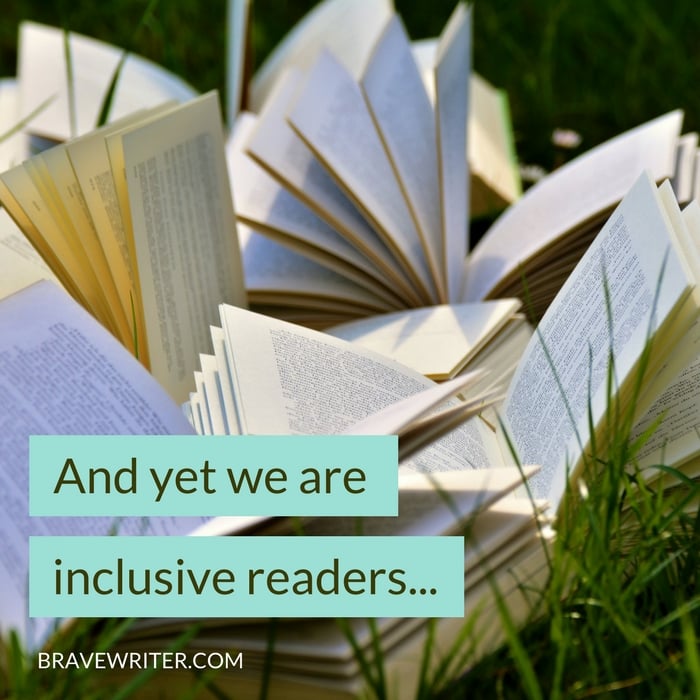And yet we are inclusive readers…

In the land of homeschool, there are many divisions. Groups form for all sorts of reasons. Some are benign: we all play cello; we are putting on a play. Some are ideological: we like classical education, we are unschoolers. Some are religious: we follow this ancient book, we follow this other ancient book. Some are not any of the above, simply: we are local to this city or town.
Over and over again, homeschoolers (already a smallish group in the community of educational options) further subdivide into even pickier criteria for forming group relationships. It’s as if it’s not enough to keep our children home where we have control over what they watch, read, and do every day. The tendency is to form tightly controlled communities for our participation as well—including the like-minded or like-behaviored, and excluding those who can’t toe our line. A policy statement—the criteria for joining—is narrowly crafted and in some cases, even designed to exclude the “dangerous other.”
I know that part of the attractive charm of home education is the notion that we can distill our values and convey them to our kids unhindered by the “big bad government” (so the feeling goes).
Yet a strange thing happens on the way to this carefully crafted community of like-mindednesss.
We read books.
We homeschoolers read LOADS of books. In fact, we pride ourselves on the variety, scope, span, and diversity of the books we read to our children. We seek books that expand our children’s experiences and enrich their imaginations.
We introduce them to monsters, thieves, people from thousands of years ago, and people living in our time. Our children meet in those pages rich people with money and poor people without, people with moral scruples and the unpleasant unscrupulous.
Heck, we introduce our kids to members of other religious faiths, scientists who have rejected religion, and characters who possess magical powers.
Many homeschoolers have a commitment to global awareness. They want their children to be “world citizens” and so they make sure that their kids read books that introduce them to faraway lands, people, and cultures from various times in history.
And yet… the co-op they attend is made up of a homogeneous group of the same type of person, carefully screened, to ensure that no dangerous difference crops up to interfere with a uniform belief system.
Does that seem contradictory to you?
It did to me. Homeschooling is a small community (in terms of numbers in general society). Yet we share these common values:
- being with our children
- enabling self-directed passionate learning
- creating powerful family memories
- flexibility to teach to a child’s strengths and challenges
- reading!
- passing on our family values and beliefs (whatever they are!)
- making a difference
…and many more.
Why would we make it so difficult for communities to welcome a diversity of home educators? The fear that someone will teach our kids something we don’t want them to teach is easily overcome. Simply don’t put your child in a class that isn’t one you want them to be in. Yet interacting with the children from a wide variety of backgrounds is as wonderful as reading about them (more so).
Do we need the art teacher and the math teacher in a co-op to be of the same religious background? Can a religious child learn ASL from a co-op teacher who is secular?
Why can’t we have the same eagerness to learn from real living families that are not like our own that we do when we read about them in books? If the belief system we hold dear is so easily undone by sharing square footage with people who are not like us, what does that say about that belief system?
I thought I’d offer these thoughts to provoke your own reflections! Your mileage may vary.


















